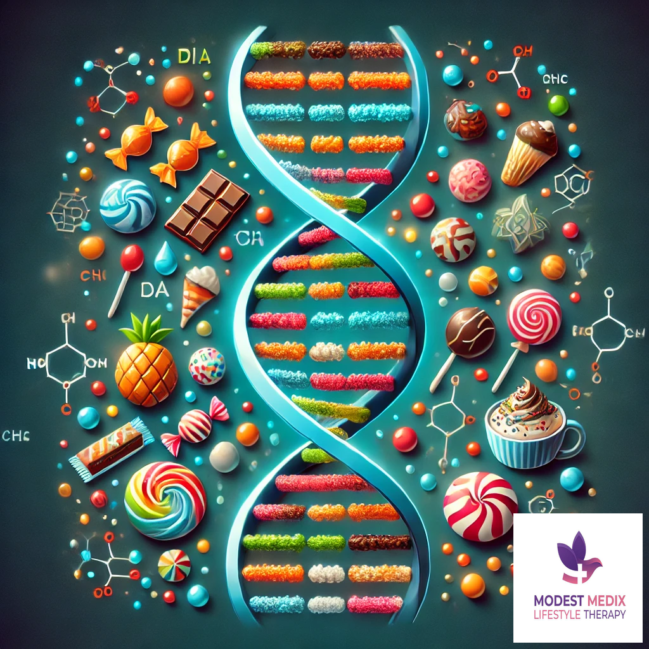Cravings for sweets after meals are a common experience influenced by various physiological and psychological factors. Understanding and managing sweet cravings effectively can improve your relationship with food and support your weight management goals.
What Is a Craving?
A craving is a strong desire or urge for a specific type of food or drink. This intense need often arises from physiological signals, psychological factors, or even genetic predispositions. Cravings can be driven by hunger, emotional states, or certain patterns established over time.
Why Do We Crave Sweets After Meals?
Cravings for sweets, particularly after dinner, arise from a mix of physiological, psychological, and genetic factors. Hormonal changes, such as the release of insulin, can trigger these desires. Psychological factors like the need for comfort or reward, along with the body’s internal circadian clock, contribute to evening cravings. Recognizing these natural triggers, including the role of genetics, can help you approach cravings without guilt.
How Can Genetics Influence Sweet Cravings?
Genetics play a significant role in determining our sugar preferences and cravings, making them more of a biological drive than an issue of willpower. Research shows that variations in certain genes, such as the GLUT2 gene, can influence an individual’s preference for sweet foods. People with specific genetic variants of GLUT2, which regulates blood glucose levels, are naturally more inclined to crave sugary foods and beverages. This means that those intense urges for sweets are not simply due to a lack of self-control, but rather are driven by genetic and physiological signals.
Understanding that cravings are biologically rooted allows for a more compassionate approach to managing them. Instead of feeling guilty or frustrated, it’s more effective to adopt strategies that align with one’s genetic makeup. Individuals can develop healthier ways to manage cravings without relying solely on willpower by focusing on personalised methods that consider these genetic factors.
How Can You Manage Sweet Cravings at Night?
Managing sweet cravings at nighttime can be challenging, but understanding the reasons behind them is the first step. Cravings are often driven by hormonal influences and environmental cues. Accepting that these cravings are a normal part of your body’s response can help reduce guilt and make it easier to manage them. Instead of questioning why you have cravings, focus on practical strategies to handle them effectively.
Effective Strategies for Handling Sweet Cravings
Acceptance and Mindful Eating:
Recognize that cravings are a natural part of eating. Instead of battling them, acknowledge them without judgment. This approach can help alleviate negative feelings and promote a healthier relationship with food.
Building a Positive Relationship with Food:
Avoid associating food with guilt or negativity. Embrace it as a source of nourishment and enjoyment. This mindset reduces the likelihood of intense cravings and supports overall well-being.
Planning and Moderation:
Planning ahead for treats is key to preventing overindulgence. Anticipate when you will enjoy a sweet treat and ensure it fits within your calorie goals. Opting for portion-controlled options, like treats under 100 calories, can help you enjoy sweets without guilt.
100-calorie Sweet Options:
Enjoying sweets in moderation can be part of a balanced diet. Here are some low-calorie sweet options that fit within a 100-calorie limit:
- Nestle Crunch Minis: 2 pieces
- Kit Kat Minis: 2 pieces
- Gulab Jamun: 1 piece
- Kheer: 1/4 cup
- A small fruit salad with a drizzle of honey (approximately 1/2 cup)
These options allow you to satisfy your sweet tooth without compromising your weight management goals.
Frequently Asked Questions About Cravings:
Below are some frequently asked questions that help dispel common myths and provide insights into how cravings work and how you can manage sweet cravings more effectively.
Is craving sweets after meals just a matter of willpower?
Craving sweets isn’t simply about willpower; it’s often influenced by biological and genetic factors. Some people are genetically predisposed to crave sugar more than others due to genes like GLUT2. Recognizing this can help in managing sweet cravings more effectively.
Are sugar cravings a sign that my body needs more energy?
This is a common myth. Sugar cravings are not necessarily a sign that your body needs more energy. Often, cravings are triggered by habits, emotions, or hormonal changes rather than actual energy needs.
Will cutting out sweets completely help me stop craving them?
Not necessarily. Completely cutting out sweets can sometimes increase cravings because it creates a sense of deprivation. Instead, practicing moderation and allowing yourself small, controlled portions can help manage cravings better and prevent overindulgence.
Do sugar cravings get worse if I skip meals?
Yes, skipping meals can actually intensify cravings, particularly for sugary foods. When you skip meals, your blood sugar levels can drop, leading to stronger cravings for quick energy sources like sweets. Regular, balanced meals help stabilize blood sugar and reduce cravings.
Can understanding my genetics help in managing sweet cravings?
Yes, understanding your genetic predispositions can help create a more personalized approach to managing cravings. Genetic testing can provide insights into how your body responds to sugar and help develop strategies that work with your unique biology.
How Can Modest Medix Support You in Managing Weight?
At Modest Medix, we take a holistic and compassionate approach to help you build a positive relationship with food and achieve your health objectives. By integrating genetic testing with personalized care, we support you in managing cravings and reaching your weight management goals.
Genetic Testing:
We offer detailed genetic analysis to understand your specific predispositions toward sweet cravings. This includes testing for genes like GLUT2, which influences your sugar preferences. By identifying your genetic tendencies, we create a tailored meal plan that aligns with your unique genetic profile and helps manage cravings effectively.
Personalized Meal Planning:
Our team tailors meal plans to suit your unique dietary needs and preferences, accessible through a convenient digital app. This app streamlines meal preparation and offers:
100-Calorie Dessert Ideas:
Enjoy simple and satisfying sweet treats that help you stay within your calorie goals.
Healthy Dessert Recipes:
Discover creative and nutritious recipes to enjoy desserts without compromising your health goals.
Balanced Eating Tips:
Learn practical strategies for balancing your diet, managing cravings, and making healthier food choices.
Holistic Support for Mindset and Behavior:
We focus on helping you shift your mindset and develop healthier habits to manage cravings more effectively. Our support encompasses:
Emotional Awareness and Regulation:
Identify and manage emotional triggers that often lead to cravings, fostering greater emotional balance.
Mindset Transformation:
Shift thought patterns to encourage a more positive and mindful relationship with food.
Behavioral Modification Techniques:
Use actionable strategies like planning, moderation, and stimulus control to reshape eating behaviors and maintain a consistent, healthy diet.
By combining emotional awareness, mindset change, and practical strategies, we help you build a sustainable approach to weight management that aligns with your goals.
Conclusion:
At Modest Medix, our comprehensive approach to weight management goes beyond just dieting. By integrating genetic insights, personalized nutrition, and a focus on emotional and cognitive well-being, we empower you to take control of your health journey. With the right mindset, tailored strategies, and consistent support, achieving a healthier lifestyle becomes a realistic and sustainable goal. Join us in building a balanced relationship with food and transforming your approach to weight management for a healthier, happier you.











